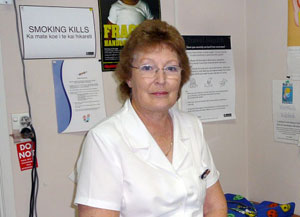Nurse Practitioner
Tasks & duties

Nurse practitioners may do some or all of the following:
-
diagnose, treat, evaluate and manage acute and chronic illness and disease (such as diabetes or high blood pressure)
-
talk to patients about their health history and give them physical exams
-
order, perform and interpret laboratory test results and x-rays
-
prescribe medications and other treatments such as physical therapy
-
counsel and educate patients on health behaviours, self-care skills and treatment options
-
help patients who have chronic conditions to care for themselves at home
-
perform minor surgery and procedures (such as suturing and plastering)
-
do research within their chosen area of practice and consult with other health professionals as necessary
Specialisations
Nurse practitioners may specialise in the following areas:
-
mental health
-
disease management
-
perioperative care (caring for patients undergoing surgery)
-
palliative care (relieving pain in patients with terminal illnesses)
-
emergency health
-
trauma (injury)
-
primary health care (health care received in the community, including health education, counselling, disease prevention and screening)
Skills & knowledge

Nurse practitioners need to have:
-
excellent nursing skills, including knowledge of different nursing methods
-
knowledge of how the human body works
-
knowledge of different diseases and illnesses
-
knowledge of medicines and treatments, and the effect these have on patients
-
the ability to observe, monitor and assess patients' conditions
-
an understanding of nursing law and legislation
-
communication and people skills, including good listening skills
-
leadership and management skills
-
excellent organisational and time management skills
-
excellent problem-solving and decision-making skills
-
computer skills
-
research skills for keeping up to date with nursing practices
Entry requirements
To become a nurse practitioner you need to have:
-
a Master's degree in nursing or health science that involves on-the-job training, and that appears on the list of qualifications approved by the Nursing Council of New Zealand
-
at least four years' experience in a specific area of practice such as emergency health, disease management or primary health care
You also need to be registered with the Nursing Council of New Zealand, and have a current Annual Practising Certificate.
To become a nurse practitioner with the right to prescribe medicines, you must meet additional education and practice requirements. These are set out by the Nursing Council of New Zealand.
Secondary education
At least four years of secondary education is required to enter tertiary training, although five years is preferred. Useful subjects include English, maths, health, chemistry and biology.
Tertiary education
A Bachelor of Nursing is required to work as a registered nurse, followed by a Master's degree to work as a nurse practitioner.
Training on the job
Nurse practitioners attend conferences and workshops to keep up to date with new nursing practices and research in their area of specialisation.
Registration
Nurse practitioners must be registered with the Nursing Council of New Zealand and have an Annual Practising Certificate. To renew this certificate, they must demonstrate that they have completed a minimum of 450 practice hours and a minimum of 60 hours of professional development in the last three years.
Useful experience
Nursing experience or any other experience working in the health industry is useful, as is education, research or management work.
Related courses
General Medicine
Nursing
For more information, please refer to Career Services.
Document Actions
